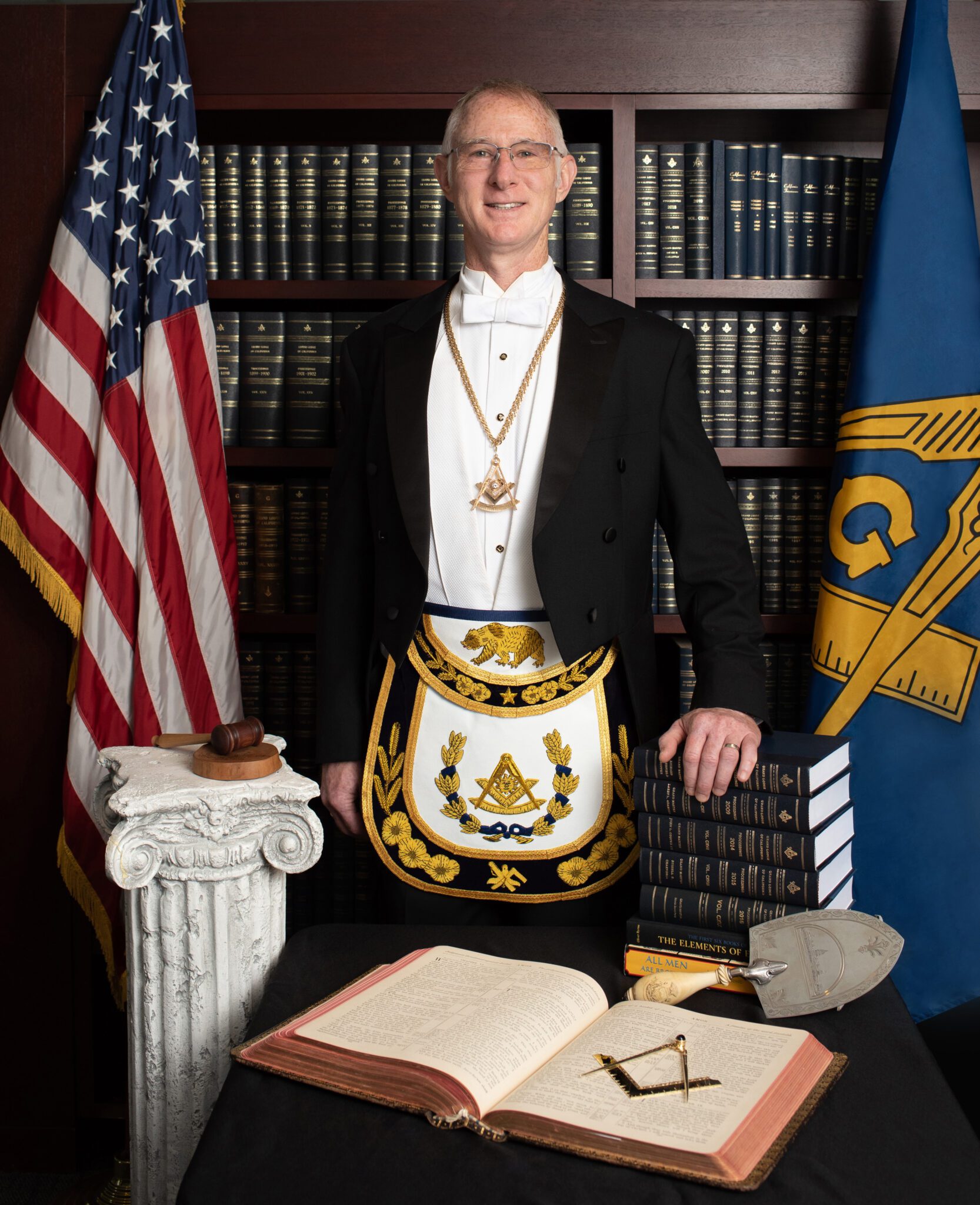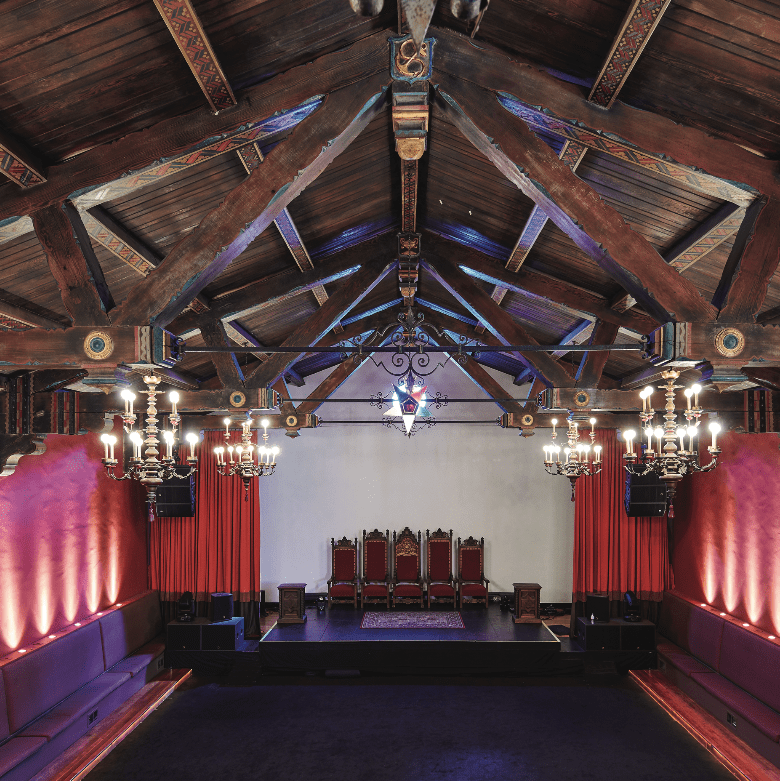
For Masonic Artifact Collectors, They’re Another Man’s Treasure
To some, collecting Masonic artifacts, rings, aprons, and jewelry isn’t just a hobby. It’s a craze.
As a social worker and hospice expert, Robert Sachs knew that the right support at the right time can transform someone’s life. And from serving as master of King David’s Lodge № 209 in San Luis Obispo, he knew that Masonic Outreach Services offered that kind of help.
But it wasn’t until he became a funeral master for the fraternity and started meeting with widows of deceased members that he discovered how few people understood the range of services the fraternity could actually offer them. Nearly every time he approached a widow to ask if they needed help connecting to Masonic Outreach Services, they’d tell him they hadn’t heard of it. “It shocked me,” he says. The lack of awareness was widespread.
“You’re told that the Masonic Outreach Services number is on the back of your dues card,” Sachs”says. “But in terms of what’s actually possible through it—the counseling services, even financial help—it wasn’t really known.”
Sachs was determined to change that, at least in his corner of the state. So he got involved in the fraternity’s lodge outreach program, which trains volunteers from Masonic lodges in each division to get in contact with elderly or needy Masons, their families, and their widows, and to explain the services available to them. Now, at quarterly meetings, he and other volunteers talk about their toughest outreach challenges and how to lean on one another to solve them. They learn about the services that MOS offers to fraternal family members—benefits just waiting to be tapped into.
While most Masons are familiar with the Masonic Homes senior housing campuses in Union City and Covina, it’s actually through Masonic Outreach Services—a division of the Masonic Homes organization—that the vast majority of Masonic assistance reaches those in need. MOS provides guidance, care management, and in some cases financial support to Masons, widows, and eligible family members no matter where they live, even outside California. It’s helped hundreds of elderly people age at home safely and with dignity by connecting them with in-home care. It’s helped others navigate health crises, job losses, and major challenges regardless of age. “MOS was created so our members and their loved ones don’t have to face tough times alone,” says Sabrina Montes, executive director. “Aging at home, financial insecurity—these problems can be really hard to solve by yourself. But you don’t have to.”
Since launching in the early 2000s, the program has quietly become the fraternity’s dominant source of Masonic relief. In 2021, it served 492 people through $3.5 million in support, up 20 percent from five years ago.
It’s all thanks to two things: funding through members’ dues and donations, and volunteers through the lodge outreach program.
Masonic Outreach Services’ nine care managers are trained in social work, so they know how to track down community resources to help with the cost of housing, food, and transportation. They can also provide hands-on case management and financial relief. And by partnering with outreach volunteers, they can help fraternal family anywhere in the state or even the country. Volunteers like Sachs do the day-to-day work of outreach, such as driving clients to doctors’ appointments, helping with household chores, and providing simple companionship.
“MOS was created so our members and their loved ones don’t have to face tough times alone.”
At other times, outreach volunteers make a difference by encouraging members to simply pick up the phone.
That’s what happened with one particular member of Sachs’s lodge. The member had endured a series of health crises and financial challenges, and he was struggling to pay rent and afford his medication. Sachs urged him to call MOS. Months later, he saw the man at a lodge dinner. “He comes up to me and says, ‘Making that call changed everything for me,’” Sachs recalls. “‘I wouldn’t have done it if you hadn’t made the suggestion.’”
Slowly but surely, as Sachs has clued more members in to the work of Masonic Outreach Services, that kind of exchange is becoming more common. It’s the shift he’s been working toward. “Now there’s a lot more awareness in the lodge,” Sachs says. “When something comes up, you’ll suddenly hear a brother say, ‘Have you ever thought of MOS?’”
For support and information about Masonic Outreach Services,
call (888) 466-3642.
To volunteer with the Lodge Outreach Program,
call (888) 466-3642 or email lodgeoutreach@mhcuc.org

RELIEF FOR CALIFORNIA MASONS AND THEIR FAMILIES
Contact us today to access your member benefits and services:
masonichome.org
(888) 466-3642
mcyaf.org
(877) 488-6293 (San Francisco)
(626) 251-2300 (Covina)
ILLUSTRATION CREDIT:
Noah McMillan

To some, collecting Masonic artifacts, rings, aprons, and jewelry isn’t just a hobby. It’s a craze.

Grand Master Jeffery M. Wilkins on how Freemasonry connects to life, death, and the cycle of renewal.

The Masons moved out ages ago, but their aura remains at the Masonic Lodge at the Hollywood Forever Cemetery.